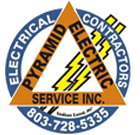Electrical contractors can help fix common issues
Electrical contractors in Charlotte NC can provide essential tips for troubleshooting common electrical issues such as flickering lights and tripped breakers. Electrical problems in your home can range from minor annoyances to major headaches. When issues like flickering lights, tripped breakers, or outlet problems arise, it’s important to address them promptly to ensure your safety and maintain the efficiency of your electrical system. While some problems may require professional help from electrical contractors, many common issues can be resolved with a bit of troubleshooting. Here’s a homeowner’s guide to identifying and fixing frequent electrical problems.
Flickering Lights
Flickering lights are one of the most common electrical issues homeowners face. The cause can be simple or complex, so it’s important to understand the potential reasons behind this problem.
- Loose Bulb: The simplest fix is to check if the light bulb is securely screwed into the socket. Sometimes, a loose bulb can cause flickering. Make sure the power is off before you touch the bulb.
- Faulty Switch: A malfunctioning switch or dimmer switch can cause lights to flicker. If you notice flickering only when you use a particular switch, it might be time to replace it. This is a task you can handle yourself, but make sure to turn off the power at the circuit breaker first.
- Wiring Issues: Flickering lights can also be a sign of wiring problems. Loose or frayed wiring can create a poor connection and cause flickering. If you suspect wiring issues, it’s best to call a professional electrical contractor to inspect and repair the problem safely.
Tripped Breakers
A tripped breaker is a common occurrence and is usually a sign that something is wrong with your electrical circuit. Here’s how to troubleshoot this issue:
- Identify the Problem Circuit: Check the breaker panel and locate the breaker that has tripped. This breaker will be in the ‘off’ position or somewhere in between ‘on’ and ‘off’.
- Reset the Breaker: Flip the breaker fully to the ‘off’ position, then switch it back to ‘on’. If the breaker trips again immediately, there’s likely an underlying issue that needs professional attention.
- Overloaded Circuit: If the breaker trips frequently, it may be due to an overloaded circuit. This happens when too many devices are connected to the same circuit. Try unplugging some devices and see if the problem persists. If the breaker continues to trip, consider rearranging your devices across different circuits or consulting an electrical contractor to upgrade your system.
Outlet Issues
Electrical outlets can develop various problems that may need addressing. Here’s how to troubleshoot common outlet issues:
- No Power: If an outlet is not working, first check if other outlets or lights on the same circuit are functioning. If not, it might be an issue with the circuit breaker or a loose connection. Ensure the breaker is in the ‘on’ position, and if the outlet still doesn’t work, check the connections behind the outlet. This task can be risky if you’re not familiar with electrical work, so don’t hesitate to call an electrical contractor if needed.
- Sparks or Burning Smell: If you notice sparks or a burning smell coming from an outlet, immediately stop using it and turn off the power at the breaker. This could indicate a serious issue such as overheating or faulty wiring. Contact an electrical contractor to inspect and repair the outlet.
- Loose Outlets: If an outlet feels loose or wobbly, it might be a sign that the mounting screws are not secure or the outlet itself is damaged. Tightening the screws might fix the problem, but if the outlet continues to wobble or doesn’t work properly, it’s wise to replace it or call a professional.
General Tips for Electrical Troubleshooting
- Safety First: Always prioritize safety when dealing with electrical issues. Ensure the power is turned off at the breaker before inspecting or working on electrical components. Use insulated tools and wear rubber-soled shoes to minimize the risk of electric shock.
- Use a Multimeter: A multimeter is a handy tool for measuring voltage, current, and resistance in your electrical system. It can help you diagnose issues such as short circuits or faulty wiring. If you’re not comfortable using a multimeter, consult a professional.
- Keep an Eye on Electrical Panels: Regularly check your electrical panel for signs of wear or overheating. If you notice any issues, such as a burnt smell or rust, it’s time to have it inspected by an electrical contractor.
- Consider Upgrading: Older homes with outdated wiring or insufficient electrical capacity may frequently experience electrical issues. Upgrading your electrical system can improve performance and safety. An electrical contractor can help assess whether your system needs an upgrade.
When to Call Electrical Contractors
While many electrical issues can be resolved with basic troubleshooting, some problems require professional expertise. If you’re unsure about handling an issue yourself, or if the problem persists despite your efforts, it’s time to contact an electrical contractor. They have the knowledge and experience to diagnose and fix complex issues safely and effectively.
In conclusion, troubleshooting electrical problems such as flickering lights, tripped breakers, and outlet issues can often be manageable with the right approach. However, always prioritize safety and consult with electrical contractors when necessary to ensure your home’s electrical system remains in top condition. By staying informed and proactive, you can maintain a safe and efficient electrical system in your home.
Work with the best electrical contractors in Charlotte NC
Pyramid Electric Services is an experienced professional electrical contracting company serving the Charlotte area, Marvin, Weddington, Mathews, Wesley Chapel, and Waxhaw. We are licensed and insured in North Carolina and South Carolina. When you want the best in residential electrical services and electrical installations, give us a call, at 803-728-5335.

